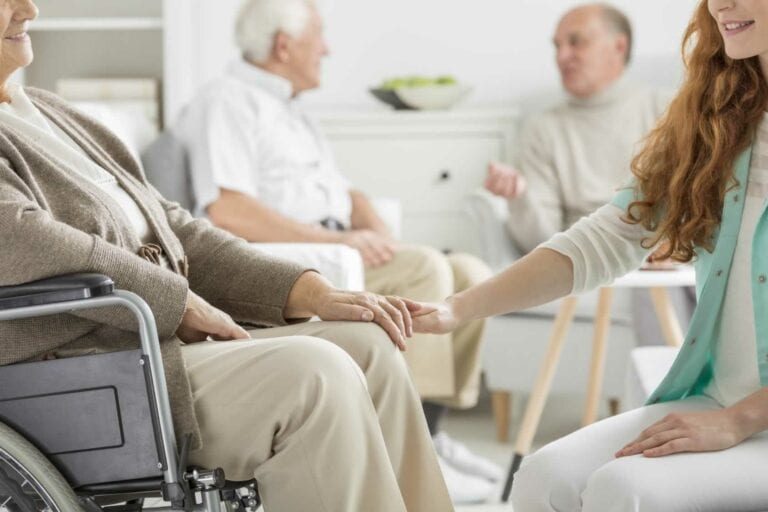
In the decades ahead, as the number of people entering senior communities continues to rise, the need for quality, consistent caregiver training increases so that these communities and their caregivers are prepared to deliver the best possible care and services.
Owners and operators of retirement communities must ensure that their employees have access to training resources that comply with the needs of their residents since most senior citizens move into their communities at later stages in their lives.
Communities that fail to provide training for citizens who have Alzheimer’s disease and other forms of dementia are often ill-equipped to deal with these unique situations. By offering training to employees, they can be better prepared to deal with residents who have these conditions. With proper training, employees will feel confident in their jobs, while providing the best care and services to the elderly.
A Family Caregiver – What Is It?
Over 18 million people provide unpaid assistance for elderly or frail relatives in the United States. This is also known as family caregivers. These people are usually women and average 60 years old. Many times the assistance that people receive revolves around things they learned to do as children, such as grocery shopping, lawn maintenance and cleaning.
They often find they have to hire help because of progressive chronic diseases. As a result, the caregiving demands progress towards greater complexity and increased burden. Managing multiple medications, managing catheters, assisting with transfers from furniture, managing colostomy and stormy care, administering routine injections, managing multiple medications, managing wound care and administering individual therapies are just a few of the things that family caregivers tackle.
What would be the advantages of better training?
The benefit of training is often discussed by owners, operators, and management teams seeking to know what it means for a community. We always say that with training, you gain empowered employees who will be more motivated to provide quality care and care for patients.
When your employees have confidence in their abilities, then their relationships with family members and staff will improve, quality of life is better, and turnover will be lower. In addition, you will see that staff and residents relationships flourish.
The ability of care-givers to communicate with, interact with, and engage with residents will improve with the provision of proper training for staff. The ability to recognize changes in health or behavior — this could reduce the number of emergency department admissions — can be increasingly important when it comes to medication management, communication with physicians, and the ability to recognize important health or behavior changes.
Problems with implementation
Many communities find it challenging to emphasize training and education of their citizens, despite the fact that it may seem straightforward. This can be due to a variety of factors, most often a lack of resources, funding, and knowledgeable individuals to conduct the training.
Key areas for training
There are some topics in training that are especially important for residents who suffer from dementia, as well as medication management and family dynamics. These are topics that can play a major part in the quality of care and the wellbeing of a resident, so training for specific areas is crucial.
-
Dementia:
Many people tend to maintain that, if they see one case of dementia, they have seen them all. However, dementia is one that requires a true assessment of each unique case. There are multiple types of dementia, and not all display the same signs and symptoms. Particularly in nursing homes and nursing homes with dementia residents, staff members should receive training so that they understand and recognize the different dementias and how to approach each case individually. Dementia afflicts people differently, and a one-size-fits-all approach to treating dementia can ruin lives. Additionally, by being in a position to identify signs and indications of the disease, caregivers can better communicate to relatives any changes they might be seeing.
-
Family dynamics:
In relation to providing training, family dynamics can be some of the hardest to understand, but they are crucial as well. Caregiver balance exists between family and friends, which training can help to improve. By providing a safe and welcoming environment for families and making them feel included and welcome, you can minimize many problematic factors. For instance, offering active participation from family members help. An informal network between a caregiver and the family can be created which can promote a sense of trust within the family, encouraging them to visit more and feel more involved in the care of a family member.
-
Medication management:
Senior caregivers need to know the side effects of available medications, including vitamins and over-the-counter pills and supplements. A person suffering from an adverse drug reaction accounts for 30% of all hospitalizations of a senior. By understanding better what not to do with drugs, caregivers can save the life of a senior.
Proven approach
Providing good training outcomes can increase awareness about its importance, and more people will be motivated to acquire new skills. When offering your curriculum, you need to be creative. Make sure the information is useful to the audience and not boring.
Like going back to school, educators who provide good education will be requested to continue providing courses. Only experience demonstrates that caregivers’ training preferences are most likely to flourish when they participate in monthly programs and when they can access training they feel will be useful in their daily lives.
References:
- Nuckols TK, Keeler E, Morton S, Anderson L, Doyle BJ, Pevnick J, Booth M, Shanman R, Arifkhanova A, Shekelle P. Economic evaluation of quality improvement interventions designed to prevent hospital readmission: a systematic review and meta-analysis. JAMA Internal Medicine. 2017 Jul 1; 177 (7): 975-85.
- Schulz R, Beach SR. Caregiving as a risk factor for mortality: the Caregiver Health Effects Study. JAMA. 1999 Dec 15; 282 (23): 2215-9.
- Burgdorf J, Roth DL, Riffin C, Wolff JL. Factors associated with receipt of training among caregivers of older adults. JAMA Internal Medicine. 2019 Jun 1; 179 (6): 833-5.







